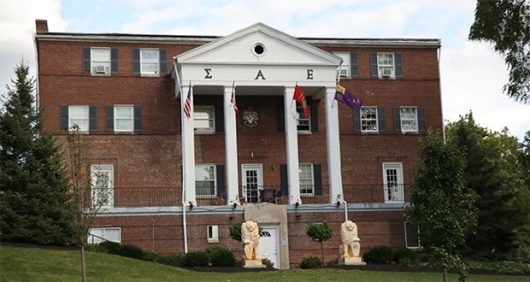There have been 11 fraternities investigated for violations of the student code of conduct by Ohio State this semester, which is nearly a third of the university’s Interfraternity Council chapters. Of the 11 chapters investigated, five are repeat offenders, all having left campus in the past.
Ohio State decided Thursday to make a sweeping statement and suspend social activity for all Interfraternity Council chapters indefinitely.
The university listed the following as the fraternities under investigation so far this semester: Alpha Epsilon Pi, Beta Theta Pi, Delta Chi, Kappa Sigma, Phi Delta Theta, Phi Kappa Psi, Sigma Alpha Epsilon, Sigma Alpha Mu, Sigma Chi, Tau Kappa Epsilon and Zeta Beta Tau.
Ryan Lovell, the university’s senior director for fraternity and sorority life, called it “an unacceptably high number” in a letter sent to all IFC chapter presidents notifying them of the suspension.
A majority of the investigations into conduct violations this semester involved hazing and/or alcohol, said Dave Isaacs, a spokesman for the Office of Student Life.

The Ohio State Beta Theta Pi fraternity is the newest Greek housing facility on campus. Credit: Jack Westerheide | Photo Editor
Ohio State’s chapter of Beta Theta Pi was shut down by its national headquarters in 2012 following confirmed incidents of hazing and a “long laundry list of things.”
Last year, the fraternity returned with a new $5 million house at the corner of East 15th and Indianola avenues funded by the chapters’ alumni.
The Delta Chi fraternity was removed from campus for five years in 2003 for hazing- and alcohol-related violations.
A press release announcing the lengthy suspension said the fraternity had been “providing alcohol to underage persons, creating situations that encouraged consumption of dangerous amounts of alcohol and “ditching,” in which members were abducted, had their hands bound, were forced into vehicles and held in an off-campus location for a period of time.”
Delta Chi was also sanctioned for hazing related violations in 2001.
“The thing that concerns us the most is that the group had put together a new member plan that said they would not be involved in this kind of thing,” said Bill Hall, the vice president of student affairs at the time. “But we have found through investigations that they are. That is probably the most disturbing thing.”
The fraternity was allowed back on campus in 2008.
Sigma Alpha Epsilon was kicked off campus by the university in 2001 for repeated violations.
Ohio State’s decision to remove the chapter in 2001 came after the university worked with the chapter for more than a year to align it with university and Interfraternity Council values, according to an announcement at the time.
“Despite repeated counseling with university staff, the young men of SAE continued to disregard not only the rules, but more important, the underlying values of both the university and their own organization,” the announcement said.
The chapter was suspended for two years and returned in 2003.

The Ohio State Omicron fraternity chapter of Tau Kappa Epsilon. Credit: Jack Westerheide | Photo Editor
Tau Kappa Epsilon also was suspended by Ohio State in 2001 for hazing and “other recent poor behavior,” according to a news release at the time.
The chapter returned after a one-year suspension.
Sigma Alpha Mu was suspended from campus in 2013 for “failure to comply with university or civil authority, alcohol and disorderly or disruptive conduct,” according to the statement announcing their suspension at the time.
The university only removed them from campus for a year, but the national headquarters kept them off until 2016.
Now, regardless of past offenses, the university has put a pause on all fraternities’ activities for the time being.
It remains to be seen how long the hiatus will last. In his letter, Lovell said this is a proactive step so the university can work with IFC to create strategies for the future in the hopes of bringing back the fraternities.
“Our expectation is that each chapter will develop a plan and implementation timeline to ensure that the culture of their organization is aligned with the stated values of Ohio State’s Greek community, responsibilities outlined in the university’s Code of Student Conduct and expectations of their respective national or international organization,” he said.
“As always, we will make the resources of our Sorority and Fraternity Life team available to support you as you complete this important work. Additionally, we are planning forums to further support and engage in proactive dialogue with you.”




